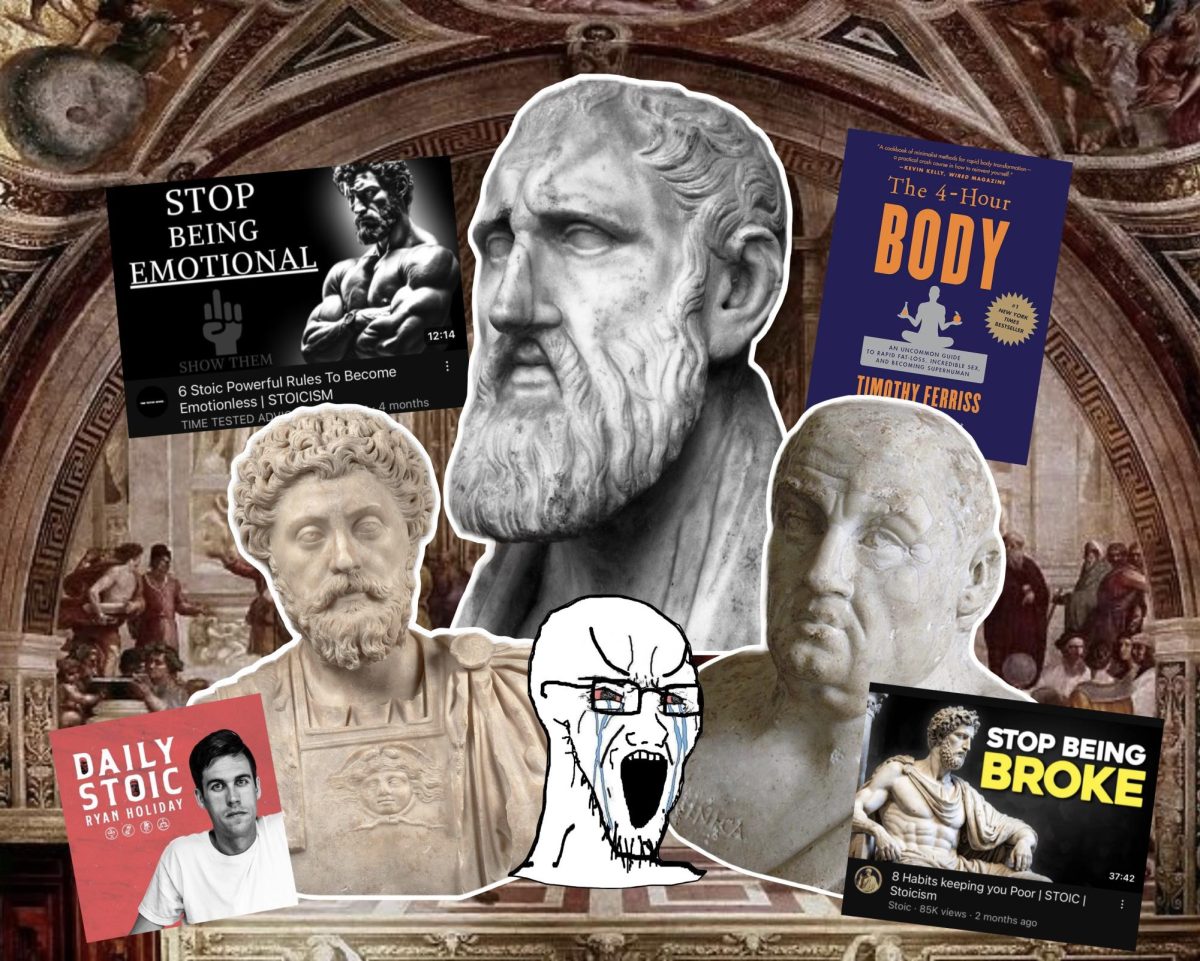On a sunny day in Athens, 262 BC, Zeno of Citium–the accredited founder of stoicism–walked out of the school of philosophies, tripped and broke his toe. Then, feeling that the gods were calling him, he promptly held his breath until he died. Hundreds of years later, finance bros have finally distilled Zeno’s philosophy of temperate passivity down to what matters: cutting off your unsuccessful friends, disengaging entirely with your emotional well-being and working every second of your life towards the one thing that really matters; money. If this interpretation sounds like a bit of a miss, that’s because it is.
Originally, not unlike the climate of modern times, Stoicism found its start in a changing world. The codes of conduct and schools of thought preached about by earlier philosophers and prophets were now bygone. The materialistic, pleasure seeking ways of philosopher Democritus and the comparatively bleak models of Cynicism were slowly going out of fashion for how the then modern Greek man was living. But with a straightforward approach from the aforementioned Zeno, a middle ground was found, following wisdom, temperance, justice and courage, or what he called the four virtues. Additionally, an “end goal” of reaching one’s desired potential and an importance on shedding one’s desire for material wealth were emphasized.
Massimo Pigliucci, Professor of Philosophy at City College of New York, who coined the term broicism in 2019, describes stoicism as “a philosophy of ethical self-improvement, aiming at making us better human beings, more just and wise.”
However, this is exactly where things start looking strange in the field of modern adaptations. More specifically, this is where broicism comes in.
Mostly based out of silicon valley, or from the mic of another copy-paste style podcast, broicism thinkers (who we will affectionately dub broics), have hammered out their own tenets. More reimagined than remade, broicism places supreme importance upon the establishment of a baser operation into one’s daily life. It, like traditional Stoicism, urges its pupils to block out the external. Above all, the power—or so it seems—of broicism is a broics ability to be unaffected. Unconcerned with loss or setback, a good Broic can walk headfirst into a metaphorical firestorm and come out without a scratch.
Where broicism drifts from traditional stoicism is in how it achieves the aforementioned goal. Traditionally, stoics sought to avoid negative personal affect by changing the guidelines by which they defined their worth and happiness, but broics attempt to mimic this with simple emotional suppression. This is also, sadly, is where broicism often intersects with some toxic forms of masculinity. Many broics — who view the ideology as a cheat code for “rapid fat loss, incredible sex and becoming superhuman,” as prolific modern broic Timothy Ferriss puts it in his self-help book “The Four Hour Body,” — try to mimic classic stoic indifference by separating themselves from emotions and forbidding emotions like fear and vulnerability entirely. Much like traditional performative masculinity, broicism shuns these emotions as forms of weakness.
“It’s toxic and pernicious. We already live in a society that exalts so-called masculinity and tells young people to go after easy fame and money. We absolutely don’t need any more of that sort of crap,” said Pigliucci. “That’s why actual Stoicism is valuable: it tells you that the hustler approach to life is one of the worst things you could possibly do, bad for your soul, so to speak.”
This kind of emotional stunting is especially detrimental to the teens that these broics are influencing. Instead of the freeing redefinition offered by stoicism, which aims to make life happier by changing the metrics by which people judge themselves, Brocism boils life down to simple metrics and attempts to approach happiness in an analytical way.
This mindset feeds directly into the callousness and competition that often defines “hustlers.” Unable to interface with their emotions, many broics begin to lose connection with others and become increasingly self centered. Tucker Evans, a senior at Summit, even sees this kind of toxic self improvement in fellow teens.
“I think people need to be aware of a very fine line between narcissism and self improvement. Philosophy is about learning, and accepting change, not putting down others for being ‘ignorant.’ Philosophy isn’t factual, it’s individual experiences,” said Evans.
As teens and young adults are sucked into the ideology of cold, unfeeling improvement they begin to lose sight of the importance of community. This is ironically in opposition with traditional stoicism, according to stoic and unfortunate advisor to Emperor Nero, Seneca.
“No school has more goodness and gentleness; none has more love for human beings, nor more attention to the common good. The goal which it assigns to us is to be useful, to help others, and to take care, not only of ourselves but of everyone in general and of each one in particular,” Seneca said of the practice.
This isolation from the self and others can lead broics on cyclical, almost sisyphean missions to become as muscular, rich and successful as possible. The unfortunate downside to these Athens inspired escapades, especially for younger generations, is its tendency to cause kids to neglect the important development of their emotional intelligence.
These deficiencies in maturity will surely come back to bite the muscled machines of day trading and drop shipping. Sadly though, if they commit themselves entirely to broicism’s tenets, broics won’t care when they do.
In addition to their misunderstanding of emotional temperance, broics have oriented their ideology around the pursuit of wealth. This goal may not run directly counter to stoicism, but it speaks to broicisms misunderstanding of the stoic principle of self improvement.
“For a Stoic wealth is a ‘preferred indifferent,’ meaning that it is preferred, other things being equal, but it makes no difference to what really matters: developing a good character and good judgment.” said Pigliucci. Money and assets are surely helpful in daily life, but when broics place them on a pedestal as the only meaningful measure of personal success, their lives quickly devolve into a cycle of hustle and loss. Ironically, stoicism first originated when Zeno lost his immense fortune and began to investigate philosophy as a coping mechanism.
“The Broic ‘view’ is sheer nonsense, I’m afraid,” concluded Pigliucci, “[stoicism] has nothing at all to do with fat loss, sex, or becoming superhuman, whatever that may mean…It would be like practicing Christianity so that we can become thin and have lots of sex. Wouldn’t you say that’s grossly missing the point?”
Like so many toxic, status based self improvement models, broicism urges its followers to become variations of one guy. A man that’s impervious to the little pockets of chaos life throws at him. Someone who spends twenty four hours in the gym, twenty four hours trading stocks, and their remaining twelve clawing “low value” people off of them as the freeloaders try to catch a free ride to the top, rounding out to a steady sixty hours of work. True stoicism encourages its followers to live in accordance with their nature, shunning unnatural societal values and returning to simpler, more important values. Broicism however — as many other modern ideologies — pulls its subscribers into a world of grueling, masochistic self improvement and for relief offers only the advice; “don’t think about it.”

































angus • Mar 4, 2024 at 11:26 am
another yapfest
z • Mar 11, 2024 at 11:50 am
found the broic guys
broseph, the only one ever • May 3, 2024 at 5:21 pm
yappity yap yap yap